February 2006
Are Fruity
Loops FL Studio 6's instruments ready to produce the sound you like
without compromise?
The new version comes with an array of sound generators of
different quality and complexity. Some of them are included, some have
to be purchased separately (see "ni" besides the name).
If this would be not enough, VST or DX
instrument (VSTI or DXI) are also supported in FL Studio 6.
You get a battery of more or less useful instruments. Some of them are
everyday tools and some are pretty unique.
What were the most impressive sound modules that are hard to get
somewhere else?
-
Sytrus - A very advanced Synthesizer
-
Slayer - An interesting
guitar-sound simulation
-
FPC
- A powerful Drum-kits/MIDI-beats combination
-
Wave Traveller - A brilliant tool for producing Scratches
-
Speech Synthesizer - "I am a robot"-text to speech generator
In order to get a
better overview of what's available, I grouped the instruments in
different categories. You can go there directly by clicking one
of the following headlines.
-
Synthesizer
-
Instrument simulation
-
Drums
-
Sample Playback/Manipulation
-
Sound Effects
-
Visual Effects
-
Tools
What do the abbreviations beside the names of the modules mean?
(ni) ....... Not included in the FL
Studio 6 package, needs to be purchased separately.
(m) ....... Monophonic sound
module. All other modules are polyphonic.
Sytrus (ni) -
Advanced FM/RM/Subtractive/Hybrid synth.
This Synth is FL
Studio 6's
advanced polyphonic synthesizer, featuring...
-
Six customizable operators for FM
(Frequency Modulation)
-
RM (Ring Modulation) synthesis
-
Plucked string synthesis
-
3 filter modules
-
Effects module with chorus
-
Three delay lines
-
Unique programmable unison mode. with
three different sound generation techniques.
Unfortunately also
it's greed for CPU power is "advanced". But it's well spent power.
It produces great
pads, arpeggios, great bass sounds and a lot of sounds that smell like
the "real thing", not cheap plastic.
You can produce
whole rhythms with drums, bass, arpeggios with this module alone.
You might be used to
get very simple and uncomplicated instruments in Fruity Loops. Well,
this one is a little different.
It takes more time
to dive into the depths of programming this synth than usual. But it's
wisely invested time. You get better and more individual sounds than
with the standard modules.
But also if you just
use the presets you have plenty of stuff to work with.
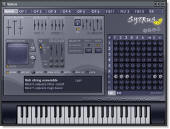 click to enlarge
click to enlarge
The next 4 synths of FL Studio 6 are quite similar from their sound character. In
Dance music you often need simple direct sounds, like a sinus or a
rectangle wave with sometimes no effect, or just a little delay on it.
These are the modules to choose for such tasks. They can also produce
the whole range of well known standard synth sounds like brass, strings,
bass, etc...in short, they are the "working horses" of FL Studio
6'es synth department, also because of they need just moderate
CPU-power.
SimSynth (ni)- Subtractive synth with
chorus.
A good Synth for
standard synth sounds like the Roland MKS modules or some Moog sounds.
Comes with a variety of presets to cover the range of standard dance
sounds of the 80ties and 90ties.
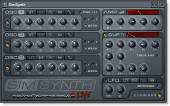 click to enlarge
click to enlarge
3x OSC - Subtractive 3 Oscillator synth.
Very basic synth
that feeds the sampler module of FL Studio 6. No presets, so you have to roll your own
from scratch. The only real reason to use it, is its low CPU power
usage.
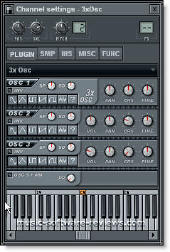 click to enlarge
click to enlarge
Wasp (ni) - Subtractive synth.
A standard
3-oscillator synth with 2 LFO's, 2 ADSR envelopes, a ring modulator, FM,
PWM and a distortion unit. Can produce a fat bass and because of the
ring modulator also very strange sounds.
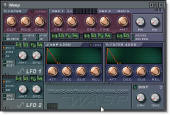 click to enlarge
click to enlarge
Wasp XT (ni) - Subtractive synth.
Is just an update of
the Wasp with a few more modulation parameters.
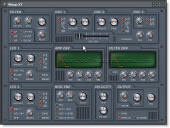 click to enlarge
click to enlarge
TS404 Generator - TB303 emulator.
A polyphonic sound
module that should reproduce the sound of the legendary Roland TB 303 -
Bassline synthesizer.
How good does it
emulate the TB 303?
Well, I wouldn't compare it to the real thing or to Propellerheads "rebirth". It just sounds vaguely similar to a TB 303 but
cannot produce that chirping sound of fast closing filter envelopes the
TB 303 was famous for.
It doesn't sound bad
however and you can use it for bass-lines or arpeggios where the
expectations at filter quality are not too high.
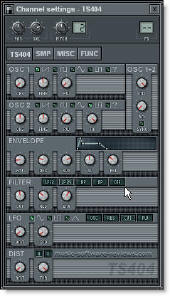 click to enlarge
click to enlarge
Fruity DX10 (ni) - Basic FM Synth.
This FM Synth is
basic indeed. You get some well known basic FM Sounds, but nothing
extraordinary.
As you probably know
these days a great share of hits contain such basic sounds. You actually
never can tell if a sound is good or bad until you hear how it works in
an arrangement.
This module (like
Simsynth) might also be a source of simple but effective sounds.
 click to enlarge
click to enlarge
Instrument simulation
FL Slayer -
Electric guitar simulation of FL Studio 6.
This is an
interesting Module for E-guitar sounds. It has a good guitar amp
simulation and you can choose from different playing styles like
strumming, power chords solo etc...
For Power chords you
just have to play the basic note and Slayer plays the chord.
Has an integrated
effects processor which is also not bad. You can add effects like
Leslie, Phaser, Delays, Harmonizer, tremolo, chorus, ring modulator,
etc...
You can build up and
fine-tune the sound with a variety of functions. So you can choose the
type of strings, the coils, the amp, the cabinet, the guitar options and
much more.
While the output is
not as advanced as Steinberg's Virtual Guitarist, it is a very useful
module with great guitar and much better bass sounds than the also
included BooBass.
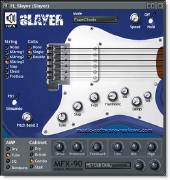 click to enlarge
click to enlarge
Plucked! (m) - Plucked string modeling
Synth.
Nice gimmick, but
not very flexible module that reminds somehow at a sound of a plucked
string. I found it not very useful.
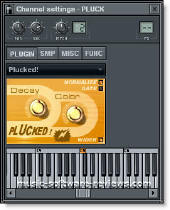 click to enlarge
click to enlarge
BooBass (m) - Bass guitar simulation.
Inflexible,
monophonic sound generator that also produces clicks when you cut off
one tone with another. Sounds like a bass with round wound strings but I
think I wouldn't bother to use it much because there are much better
instruments in FL Studio 6.
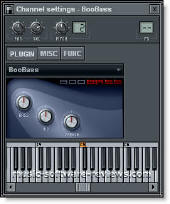 click to enlarge
click to enlarge
FL Keys - ROMpler for Piano, E-Piano and
Organ sounds.
This is a very
minimalistic sound module for the very basic keyboard sounds in music
production.
I liked the piano,
it sounded surprisingly natural over the range C3-A7. Don't expect
miracles however. The piano is made of only 15 samples with together
only 1Mbyte !!! sound data. No velocity layers at all!!!.
The e-piano is
nothing for hardcore Fender Rhodes players but it sounds quite good
within an arrangement. The default sound has infinite sustain and a
delay effect on it. If you put that away you have a standard Fender
Rhodes sound with 3 velocity layers. Nothing to brag with, but useful.
While it is quite
O.K. to have one sound for Piano and E-Piano it is a bit poor for an
organ. Without drawbars or at least a choice of different sounds it
cannot be called a real organ.
But if you just need
any organ sound to test an arrangement it might be good enough and
doesn't capture a lot of resources of FL Studio 6.
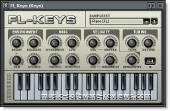 click to enlarge
click to enlarge
Drums
Fruity Kick - Kick simulation.
Quite simple and
straight-forward module for Dance Tracks. You get a flexible bass drum
with a good basic sound, that you can always adjust to your song with
just a few clicks.
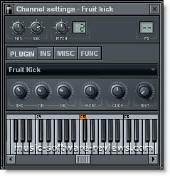 click to enlarge
click to enlarge
Fruity DrumSynth Live (ni) -
Percussion Synthesis.
A sound module for
synthetic percussion sounds. You have a preconfigured drum set of Roland
Tr-808 and TR-909 sounds on the keyboard and you can morph with a wheel
between one sound that is already playing and another one that you
choose from a list.
The basic sound
character is of course very Roland TR-808/909 like because it utilizes a
similar sound generation technique.
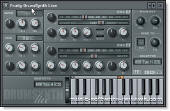 click to enlarge
click to enlarge
FPC - Advanced Drum Sampler
This is not only a
Sampler. It is something I have on my wish list for quite some time and
I always wondered why the programmers of Sequencers didn't implement it
earlier in their products.
It is a library of
MIDI-beats and a
Drum Sampler quite similar to the well known Akai MPC Drum
computer combined in one module.
That means you can
change the Drum set and what it is playing very easily and independent
from each other.
It has some very
groovy beats and sequences in it's library that range from straight
dance over funky break beats to Rock and World Music.
Included are only
two Drum Sets but there are more to buy.
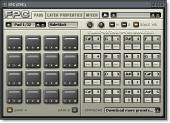 click to enlarge
click to enlarge
Audio Clip Generator - Holds
recorded audio.
This module is the
simplest sample player and mainly intended to play recorded audio in the
audio tracks.
Despite that, you
still could choose from a variety of functions like remove DC offset,
normalize, reverse, etc... but you would most likely not touch them but
do most of the sound refinement in the mixer.
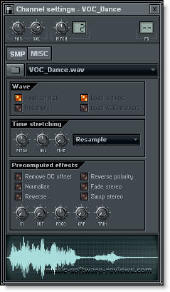 click to enlarge
click to enlarge
Sampler Generator - Basic channel
sample playback.
This is the most
basic sampler of Fruity Loops FL Studio 6. It is fed by a Wav sample and
contains four envelopes and five LFOs for controlling volume, panning,
pitch, cutoff and resonance of the output.
Beside the usual
Sampler functions like looping, tuning, normalizing or reversing you can
choose whether you want the sample stream from disk or load entirely
into memory.
A crucial function
for a software like FL Studio is of course how well the samples adapt to
the project's speed. You can choose from a variety of options for
different kind of samples.
The results are
pretty good while you still can hear some unwanted artifacts when the
tempo change is too drastic.
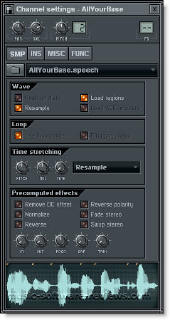 click to enlarge
click to enlarge
Direct Wave (ni) - A more advanced
sampler.
I was quite curious
what the "advanced" sampler of fruity loops has to offer.
The description in
the manual says that it features inbuilt FX, velocity-layering, looping,
automatic sampling of VSTi plug-ins and the ability to record sound
(sample) when loaded into a mixer track on an effect slot.
It imports the
following sample file formats:
-
AKAI
-
Battery (Only version 1, not version 2
banks).
-
DWP (Direct Wave Sampler's native
format)
-
EXS24
-
Kontakt (Only version 1, not version 2
banks).
-
Recycle
-
SoundFont2
The Sampler of FL
Studio 6 has most
of the standard functions you would expect from a sampler. You can map
samples in keyboard and velocity zones, tune, set root key etc...
But what does it
offer beside that?
The more advanced
functions are Beat Sync where you can automatically adapt the
playback peed to host tempo.
Slice Mode
cuts a sample into equal pieces and maps it to consecutive keyboard
notes above root key.
What about
Filtering?
Well, there are two
filters either serial or parallel. You can even get them to resonate.
But it doesn't sound good. If you don't take care it sounds distorted
and when you turn the control knobs you hear glitches.
With the generous
modulation matrix you can assign an LFO or any other source to the
filter cut off.
Effects?
Per Keyboard Zone
you have a Ring modulator, a Phaser and two rather strange effects
called Decimator and Quantizer that reduce the Bit depth.
The Ring modulator
and the phaser sound good. You can control them via the modulation
matrix.
You can either sync
the LFOs to your projects tempo or let them run free.
In the main section
you have three common effects, where any keygroup can route it's own
amount to it, a delay (either straight or bouncing), reverb and chorus.
Fortunately the
delay can adapt accordingly to the playback speed.
The reverb sounds
not bad and the Chorus more like a Phaser. Feedback setting should be
low otherwise you hear a shutter effect.
All in all a useful
module if not as "advanced" as it is announced. There are far more
advanced soft samplers around, but you might not need them.
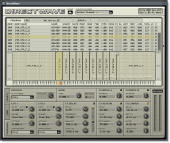 click to enlarge
click to enlarge
Fruity Granulizer - Sample based
granular synthesizer.
Basically a module
for time stretching and pitch shifting but more to produce special
effects, than to stretch without artifacts. It uses granular synthesis technology, but this is maybe not
that important. It's more important how it sounds like.
Well it sounds
unique. You can take a spoken voice and produce very strange "Max
Headroom"-like effects with it. You can take a well known sample and
change it to something completely different.
The effect is hard
to describe because it is so different relating to the settings and the
sample it is used on. Sometimes it sounds like scrubbing through a sound
file where the part around the cursor gets repeated
An instrument for
the "Tweaker". It can produce completely unique sounds but is not easy
to understand and control. There is no other way than to play around
with the controls and see how they influence the sound.
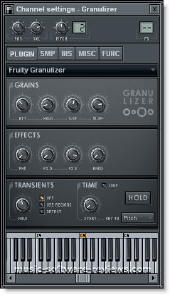 click to enlarge
click to enlarge
Fruity Beat Slicer (ni) - Slices
samples like drum loops for playback
This is a module that works similar to Steinberg's Recycle. The big
advantage however is that it's already integrated into the program.
That means, if you
load a sample in the module it either uses beat detection algorithms to
slice up a wave file into pieces, or if the loaded loop contains already
slices/regions they will be recognized and used instead of
auto-detecting them.
It automatically
creates a MIDI-note for each piece in the piano roll.
That means you can just load the loop-sample, click play and in most
cases it's finished.
What makes this
module a real no-brainer is the fact that the programmers obviously took
care for the little problems that can make groove programming a rather
tedious task.
They built in
effective measures to prevent clicks, to fill the gaps between slices,
to find the right transient points for slicing etc...That makes the life
of groove programmers all over the world a bit easier.
You also have
effective presets to rearrange the order of the slices.
In short, this is
the module that makes it so easy to work with this software and
justifies the name "Fruity Loops". ;-)
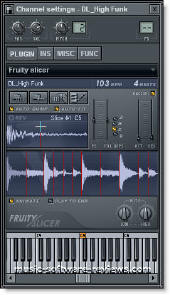 click to enlarge
click to enlarge
Fruity Soundfont Player (ni)
- Soundfont Rompler
Soundfonts are
standardized sets of Multisamples that you can load into into any
Soundfont player.
The original
SoundFont specification was developed in the early 1990s by E-mu and
Creative Labs. The first major device to utilize the technology was
Creative's Sound Blaster AWE32 in 1994. A new 2.0 format was developed
in 1996, and the current version is 2.1.
The sound quality of
SoundFont banks is usually superior to standard GM banks, and many
SoundFont banks have been created specifically to replace GM banks.
As you get lots of
free Soundfonts and Soundfont editors on the Internet, it is the best
opportunity to get excellent sounds for little money.
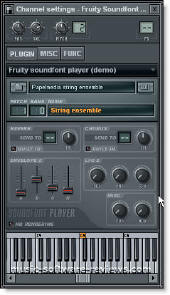 click to enlarge
click to enlarge
Sound Effects
BeepMap - Image based synthesizer.
Makes sounds based on pictures.
As you can imagine this sounds are not
really tonal but more like spherical and mysterious noise. Very
interesting module for movie score composers to create atmospheres and
background effects.
Imagine as many sine wave sound generators
as the picture has vertical pixels. You can set the lowest and the
highest frequency. These generators are triggered by a vertical line
that scans the picture from left to right.
The red color triggers the left
generators, green color triggers the right ones. For instance
Yellow (a mixture of red and green) will sound equally on both channels.
Optionally, the blue component is used to define the frequency range per
pixel, but normally you choose that in the settings..
You can just make a graphic file, maybe
with the above data in mind and save it to disc.
Beepmap can read the following formats:
jpg, jpeg, bmp, png, ico, wmf, emf, dib
Load that graphic file into BeepMap and
push the play button. The basic sound character is a bit ring-modulator
like. You can adjust the frequency range and the playing speed to your
needs.
This is again a module that lets you
create unique sounds with a minimum of technical effort.
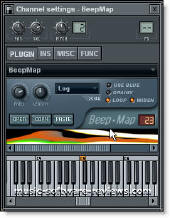 click to enlarge
click to enlarge
Wave Traveller
- Scratching Tool. Sample warper and slicer.
This is a sensational module for all dance producers that use scratches
in their music.
With the
Wave Traveller, FL Studio 6 lets you become
the "Scratch Master" of all time. No kidding. You just load the sound
you want to use for scratching as sample and draw your scratch with a
rubber band curve.
Because you see the rhythm grid behind the curve you can build very
exact scratches. They can be faster and more exact as with live
scratching.
After you got how it works, no scratch is too difficult or too
complicated.
Yes
you can even mix it with transformer switching. As sections of the audio
phrase can also be muted you get that well known rhythmic stuttering.
Each MIDI note can be assigned a different Scratch-effect from the same
sample in case you need that.
It
takes a little time to learn how to use it, but the outcome is very
convincing. Great module!
 click to enlarge
click to enlarge
Speech Synthesizer - Text to voice
effect
This is also a very useful tool, used by many Dance producers. It seems
that Image Line, the developers of FL Studio 6 are really into the
Dance scene and know what's needed there.
Works very uncomplicated. Type in your text and choose personality,
style and mode. You can also select the speed and the pitch.
After closing the window the phrase is available as Sample in the Fruity
Slicer for further use.
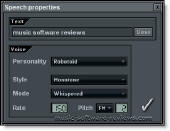 click to enlarge
click to enlarge
Visual Effects
Chrome - Video
Synthesis (lightshow).
A very nice gimmick that lets you play
visual effects on a MIDI keyboard. So you can choose a scene and play a
firework with your keyboard in it.
I don't know what someone would use it
for, but it is really nice to watch and to play with.
 click to enlarge
click to enlarge
Fruity
Video Player (ni) - Play videos in sync with FL Studio Projects.
A nice uncomplicated video player that
lets you even play full screen videos. All native Windows formats are
accepted. You can't convert formats or save however. It's only a player.
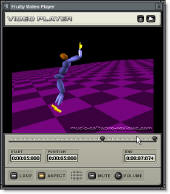 click to enlarge
click to enlarge
Buzz Generator Adapter -
Adaptor to host Buzz generators.
Buzz is a free
modular system to create a complete virtual studio environment. See more
information on
www.buzzmachines.com.
You can download
such machines as softsynths, effects, generators, etc...to use it as FL
Studio 6 instruments.
While the user
interface is graphically very minimalistic, the sound is not.
It's really worth
trying. You get some interesting stuff and it's also CPU power friendly.
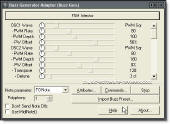 click to enlarge
click to enlarge
Dashboard - Design your own internal
controllers
Did you ever wanted to control all your external MIDI devices with
dedicated
on screen controllers that you can even
dynamically automate?
Well here's the
solution.
Dashboard is a construction set of FL Studio 6 with faders, Knobs and
switches, that lets you create software interfaces for your external
MIDI hardware, such as expander modules, keyboards, mixers, samplers,
etc...
You can also record
the changes as automation data.
Dashboard includes
several pre-made panels (presets) for popular MIDI devices you can use
directly in your projects. You can customize the existing panels for
your own use or create new ones from scratch.
The presets include
Peavey Controller, Phat-Boy and Roland XP-30.
This way, you can
adapt Dashboard for any MIDI device you own without using plug-ins
dedicated to a specific hardware.
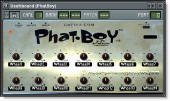 click to enlarge
click to enlarge
Fruity Wrapper - Hosts VSTi/DXi
plugins.
For using 3rd party
software like plug-ins or virtual instruments it's always the question
how well they are implemented and how buggy they are.
Installation is not
complicated. Just tell FL Studio 6 where your VST or DX instruments or
plug-ins are (in the File settings menu) and you can load them into the
wrapper.
After you have
loaded your instrument you can load a preset that you like, tweak and
save it, and then do other useful things. You can...
- ...link the last
turned knob to an external controller.
- ...link all other
parameters to an external controller
- ...open an
automation clip for that controller.
- ...copy and paste
the values of knobs.
- ...define the
position of the knob when song starts.
- ...edit the last
value.
In short, it lets
you perform all the automation and the controlling via external
controllers. Very good. That is what's needed.
You have also quite
a lot of options to tweak problematic 3rd party plug-ins. This is very
useful if you want to use some non standard plug-ins that caused
troubles.
bugs: The
first time when I installed the VST folder and some 3rd party VSTis, FL
Studio 6 did not recognize it from the channel menus. All refreshing did
not have any effect.
I could however
choose them as mixer channel plug-ins. After I did that, I could also
see them in the generator list from the channel menu. Since that, it
recognizes VSTis correctly.
Generally the
standard of bug prevention and 3rd party plug-in handling is pretty high
in this program and you have a lot of useful options to tweak and
control a plug-in.
 click to enlarge
click to enlarge
Layer Channel - Stack channels to
play in unison.
That is a very
simple module to build up a stack of modules that play simultaneously.
It let's you set children that get played by this channel. It doesn't
produce sound by itself.
If you play a note
either all children play that note or, if set to random, one of them
plays it. You can also cross fade between the children channels.
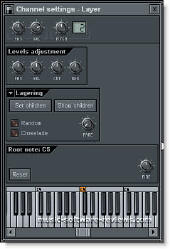 click to enlarge
click to enlarge
MIDI Out - Control MIDI hardware and/or
VST plug-ins in Fl Studio 6.
This Controller
provides eight pages each with nine freely assignable controllers. It
sends standard MIDI messages to plug-ins or instruments.
Of course you can
link these virtual knobs to real knobs of an external controller.
You can also create
automation for these virtual knobs.
Good designed module
that has everything you need to effectively control your instruments,
whether external or internal.
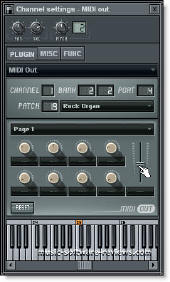 click to enlarge
click to enlarge
ReWired - Host any compatible ReWire device
in FL Studio
With this tool you
can grab you one ore more of these cool ReWire devices like
Rebirth or Reason and use it with your
fruity loops software.
It supports sample accurate audio synchronization and MIDI
compatibility.
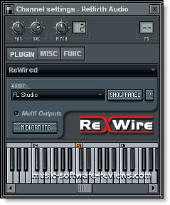 click to enlarge
click to enlarge
Conclusion:
The Fruity Loop FL Studio 6 instruments give you a lot of music
production power. Some of them are also quite unique and hard to find in
other software.
While not all of them are "state of the art" instruments, they are
useful and combined with the superior workflow of the FL Studio 6
Software, they certainly deliver what you need for a dance hit.
If you need more there is also no limit. Because it supports DXI and
VSTI Plug-ins, it became an open system with almost unlimited capacity.



